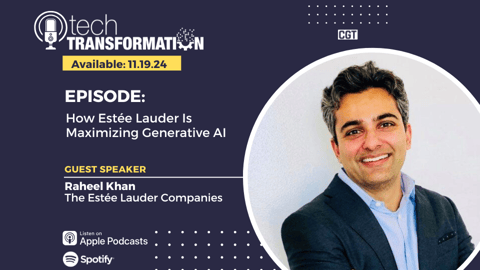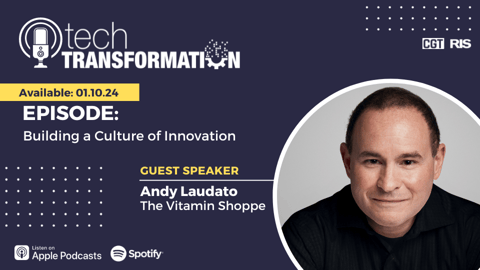Tech Transformation Podcast: The Lego Group’s Bill Shube On Learning to Speak Like an IT Pro
When the pandemic started, there were a lot of bored kids at home, so what did a lot of bored parents do? They bought them Legos! In this episode of Tech Transformation, we dig into how The Lego Group kept its tech teams flexible and aligned during a period of massive disruption. Listen to learn from Bill Shube, supply chain OPT&A senior manager at The Lego Group, and Gib Bassett, solutions marketing director at Alteryx and CGT/RIS Executive Council member, about the power of low code and what it means for the future.
We discuss:
- Some of the most significant changes Lego made to keep up with an intense increase in consumer demand
- The impact of the pandemic on Lego’s IT teams
- How it’s using these learnings across the enterprise
- Why IT flexibility and alignment is so important for consumer goods companies and retailers today
- Why this can be so difficult — and some tips to get better at it
- How companies can maximize their data literacy and break down silos
- The power of low code and what it means for the future
Subscribe
Do you have a question for our guests or an idea for an episode? Leave us a message, and we'll respond on a future episode or contact you directly!
Excerpts
Shube on Lego’s new path: “The path that we're on now is new and it's different. And I think we're heading in the right direction. We always knew that our processes were too manual, our systems weren't really supporting us the way that we wanted them to, and we've tried to address those problems in the past. And we've never really found the secret formula to solve those problems. And now I think we're getting there.”
Shube on the shifting relationship with IT: “I think many of your listeners have probably heard the phrase citizen data scientists. We've become citizen data engineers. And to do a lot of the things that we need [and] want to do to improve our business, we no longer need the coding skills, the engineering skills that used to be required, that we just have to go to IT for. And to be clear, I'm not saying that we don't need data engineers or IT — we definitely need them. But the division of responsibilities between IT and the business is shifting for the better.
"In the past, if we needed a new tool or something to be developed, we'd go ask IT and we'd ask them to develop pretty much the whole thing, right? We say, here's what we need, and we tried to describe it as best we could, and they'd go off and try to figure out how to do that. And that was never a good way of doing things because they don't understand our business. We understand the business. Now, contrast that to now, we can just go to IT and say, just give us the data. Give us access to the data, build some pipelines, and we can do the rest. We can model the data together ourselves since we understand it better, we know how to interpret it. And we understand what our end users need, because we're a local team and we’re right next to them all the time.”
Bassett on analytics as a team sport: “It really is about trying to negotiate and collaborate. It comes down to ultimately kind of like a human-to-human kind of issue, that people need to talk to each other. They need to understand that division of labor — that is not just my job or your job, that analytics is a team sport, as a lot of people talk about.”
Tech Transformation Video
More of a video person? Click here to watch a high-level overview of the conversation, and watch more Tech Transformation videos!







